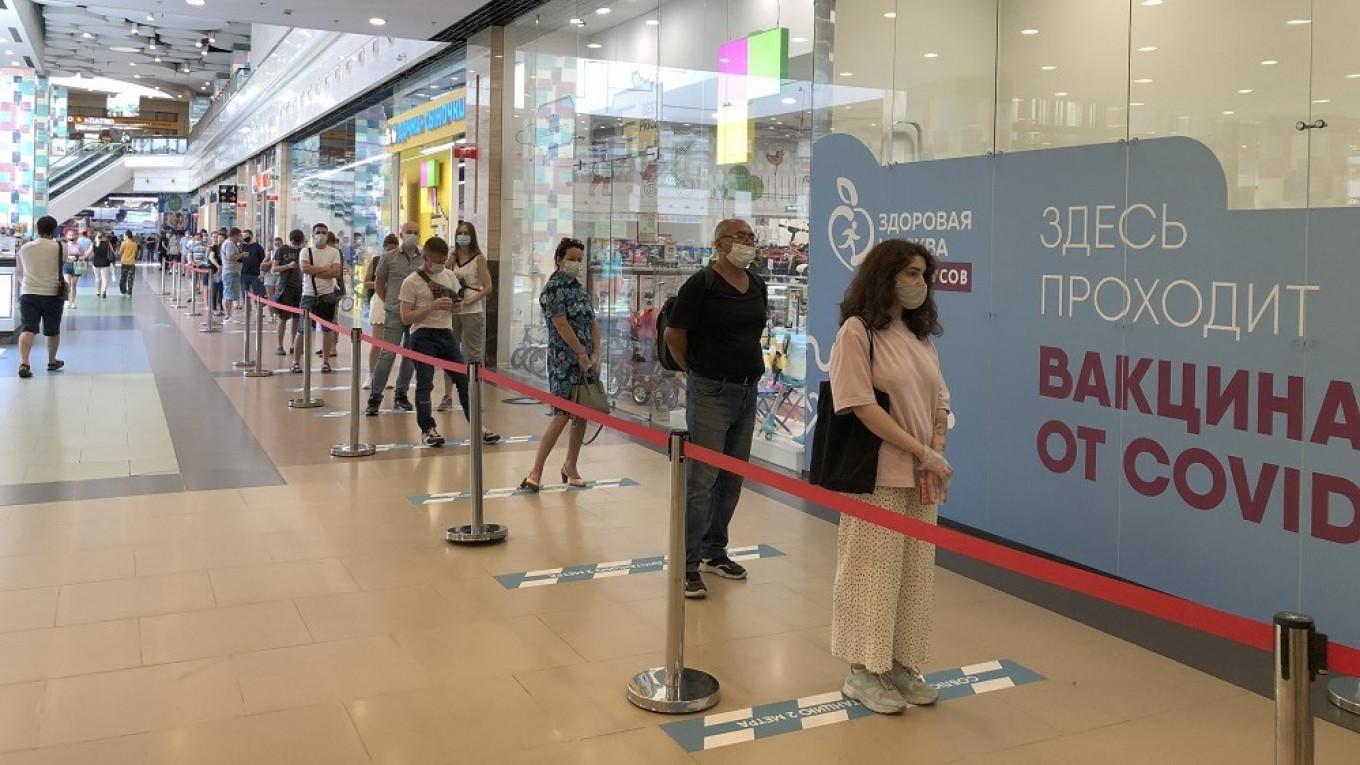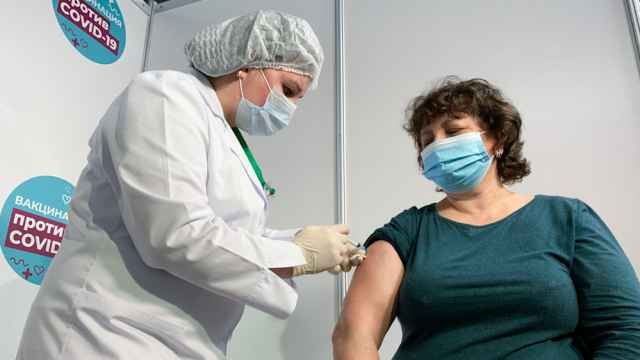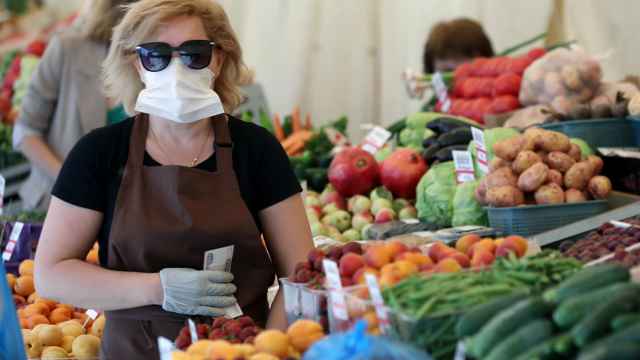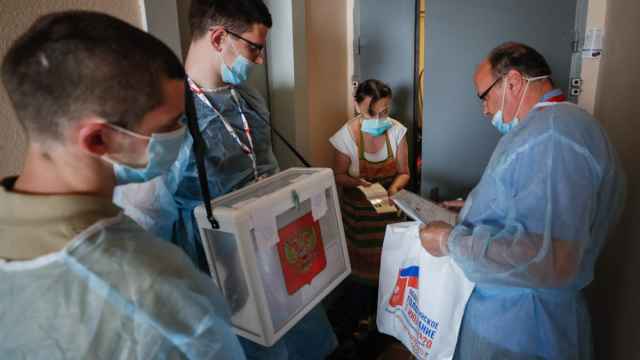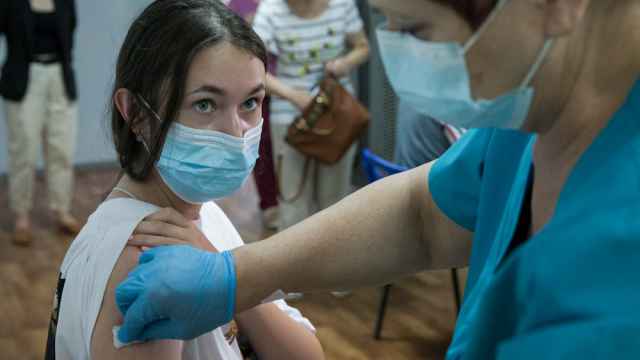Moscow has rolled out one of the world’s most ambitious mandatory vaccination schemes, requiring 60% of all service sector workers — more than 2 million people — in the capital to be fully vaccinated within the next seven weeks.
The unprecedented push comes as the city faces a surge of cases and hospitalizations, and only around 16% of Moscow residents have received a first dose of a coronavirus vaccine.
Several other Russian regions have followed suit and announced similar mandatory vaccination rules for service sector workers and civil servants.
What are the rules?
Businesses in the service sector must ensure 60% of their customer-facing staff get vaccinated with one of the four coronavirus vaccines approved for use in Russia. At least 60% must have received a first dose by July 15, and the same proportion must be fully vaccinated by Aug. 15.
The rules cover a host of service industries ranging from restaurants and bars to bank branches, post offices, fitness centers and transport providers, including both civil servants and employees of private enterprises.
Remote workers and self-contracted freelancers are also included in the 60% calculations — meaning the rules extend to Russia’s sizable gig economy businesses such as fast food delivery firms and taxi aggregators.
How many people will need to be vaccinated?
In Moscow, Deputy Mayor Anastasia Rakova estimated between 3.5-4 million people work in the categories subject to the mandatory vaccination decree, meaning at least 2.1-2.4 million of them will need to be vaccinated by the deadlines.
Moscow has so far administered first doses to some 2 million residents out of its official population of 12.7 million. It is not known how many service sector workers had already been vaccinated before the new rules came into force.
What happens if workers refuse?
Russia’s leaders have said the campaign is not “forced vaccination,” and that Russians still have the right to refuse to be vaccinated. Kremlin spokesperson Dmitry Peskov said Monday that there was no “de facto or de jure” mandatory vaccination in Russia.
But authorities have said that employers have the right to suspend workers without pay who refuse to be vaccinated.
Peskov went a step further, saying Thursday that Muscovites in the service sector who don’t want to be vaccinated “should simply stop working in the service sector.”
The 40% of workers who are not vaccinated should consist of employees who are unable to receive the vaccine for medical reasons and others “at the employer’s discretion,” according to the government’s official guidelines for businesses.
How will it be checked?
Checks will be conducted online using Russia’s nationwide vaccination database which contains the details of every Russian who has been vaccinated against the coronavirus.
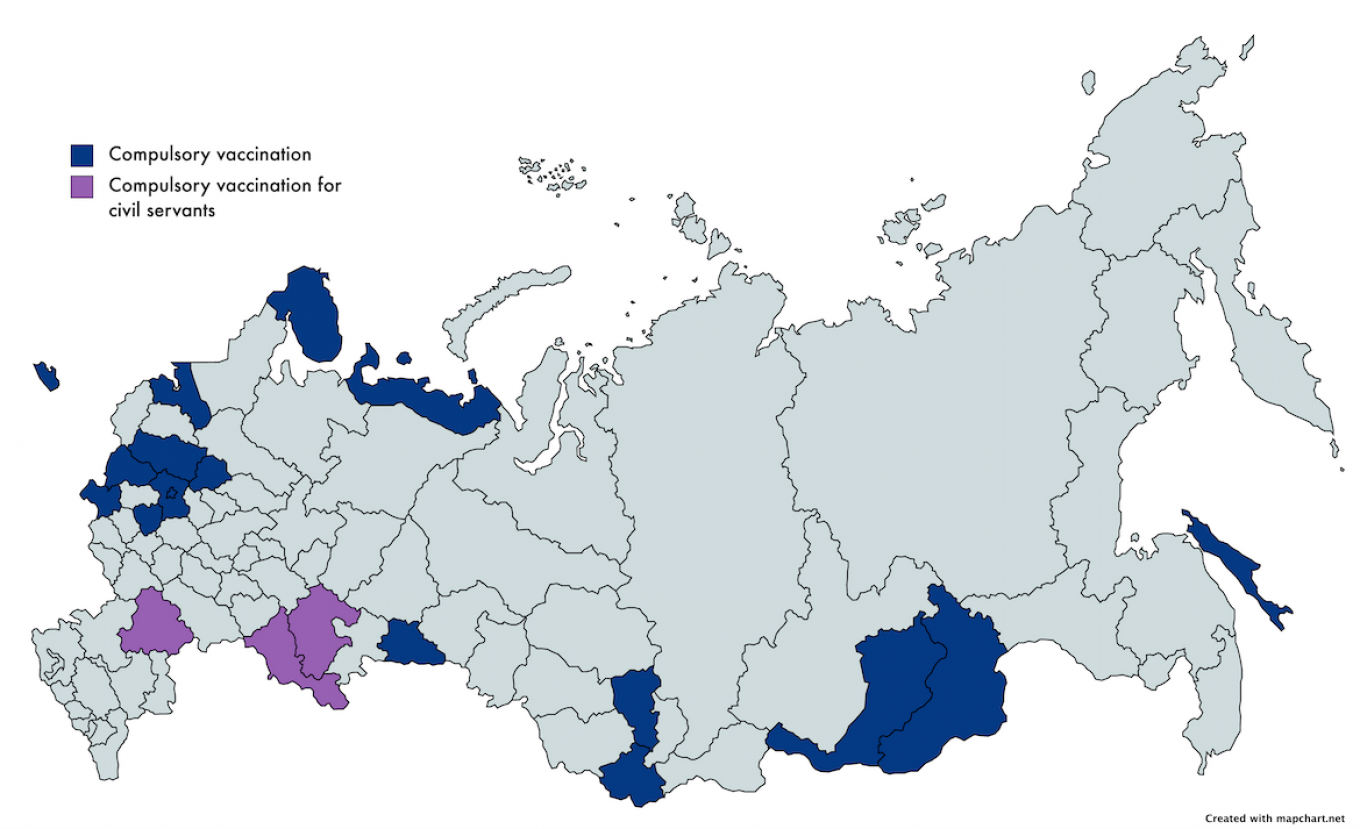
Businesses will be required to submit a roster of employees, their relevant personal data and job function through a government web portal before July 15. City authorities will then cross-check this list against the national vaccine database to ensure each business has reached the 60% requirement.
What if businesses do not ensure 60% of their workers are vaccinated?
Moscow authorities say by law they have the right to fine businesses who do not meet the requirements and/or shutter their locations in the capital for up to 90 days.
In guidance issued to employers by Moscow’s coronavirus taskforce and the Rospotrebnadzor consumer health watchdog, representatives said that in light of the seriousness of the epidemiological situation, they would recommend that authorities close down businesses that do not abide by the rules, rather than issue fines.
Is it legal?
Under Russian law, each region’s chief sanitary doctors have the right to declare an epidemiological emergency, during which regional authorities can introduce mandatory vaccination programs. Moscow’s coronavirus task force has said the measures are legal and has been actively sharing legal opinions which support that position.
Both politicians and lawyers also point out that the scheme falls short of complete compulsory vaccination as workers do have the right to refuse to be vaccinated.
“The fact is that the employer cannot physically force employees to be vaccinated,” lawyer Yevgeniy Korchago told The Moscow Times.
Will non-Russians have to be vaccinated?
Foreign citizens are included in the requirements to vaccinate 60% of employees.
Moscow Mayor Sergei Sobyanin announced Monday that businesses will soon be able to organize the vaccination of their foreign workers with the one-dose Sputnik Light vaccine at 1,300 rubles ($18) per dose. The city started vaccinating labor migrants in pilot mode Sunday, with employers having to file a special request to have their staff included in the scheme.
Rules and guidance around the vaccination of foreign citizens in Russia have changed since the start of the country’s mass vaccination campaign six months ago. Initially, foreign citizens could easily get vaccinated for free in state clinics. But earlier this year, Moscow authorities restricted vaccination for foreigners who lack residency papers and public health insurance. According to Moscow’s official vaccination web page, only citizens of Russia are eligible to be vaccinated in state clinics for free. Some private clinics have continued vaccinating foreigners without full residency documents for a fee. Earlier in June, President Vladimir Putin said Russia should develop its vaccine tourism industry, noting that many foreigners had already come to Russia and paid for a jab.
Businesses have called on the government to make vaccination of foreigners easier — for instance, without requiring proof of a work permit — in order to help stop the spread of the virus.
What has been the reaction?
The campaign has been received with cautious optimism from employers, many of whom told The Moscow Times they favored this approach to a full lockdown or forced closures which would hit their income. However, business owners were frustrated that authorities were once again putting the responsibility to tackle the pandemic on their shoulders — with employers having to force staff to be vaccinated, check employees’ vaccination status and potentially face being closed down if they do not meet the target.
The reaction of residents has been more mixed. One poll by recruitment firm and market researcher Superjob found 60% of Russians were opposed to mandatory vaccination. According to another survey by state-run pollster VTsIOM, 52% of Russians believe mandatory vaccination of service workers would help stop the spread of the virus.
Sobyanin said there has been a surge in demand for vaccinations in the capital since the announcement, with up to five times more people being vaccinated per day than before. Many of those finally taking the jab have said they were doing so reluctantly in order not to lose their job, while others say they will ask their employers to include them in the 40% who do not need to be vaccinated.


